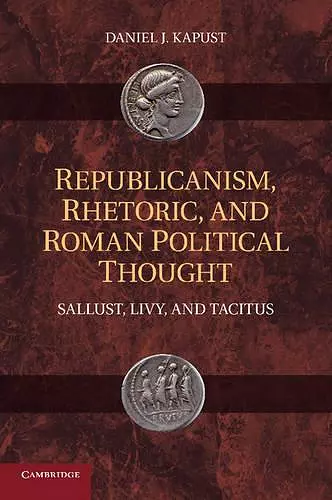Republicanism, Rhetoric, and Roman Political Thought
Sallust, Livy, and Tacitus
Format:Paperback
Publisher:Cambridge University Press
Published:11th Sep '14
Currently unavailable, and unfortunately no date known when it will be back

Develops readings of Rome's historians Sallust, Livy and Tacitus in light of contemporary discussions of republicanism and rhetoric.
Republicanism, Rhetoric, and Roman Political Thought develops readings of Sallust, Livy and Tacitus in light of contemporary discussions of republicanism and rhetoric. Drawing on recent scholarship and other classical writers and later political thinkers, this book interprets the three historians' treatments of liberty, rhetoric, and social and political conflict.Republicanism, Rhetoric, and Roman Political Thought develops readings of Rome's three most important Latin historians - Sallust, Livy and Tacitus - in light of contemporary discussions of republicanism and rhetoric. Drawing on recent scholarship as well as other classical writers and later political thinkers, this book develops interpretations of the three historians' writings centering on their treatments of liberty, rhetoric, and social and political conflict. Sallust is interpreted as an antagonistic republican, for whom elite conflict serves as an outlet and channel for the antagonisms of political life. Livy is interpreted as a consensualist republican, for whom character and its observation helps to maintain the body politic. Tacitus is interpreted as being centrally concerned with the development of prudence and as a subtle critic of imperial rule.
'Daniel Kapust's nuanced exploration of the relationship between rhetoric and deliberation provides a timely contribution not only to the renewed scholarly interest in Roman political thought but also to how we think about our contemporary politics.' Dean Hammer, John W. Wetzel Professor of Classics and Professor of Government, Franklin and Marshall College
'Republicanism, Rhetoric, and Roman Political Thought is erudite, well written, and original. Daniel Kapust deserves praise for so seriously and systematically presenting the historians of the Roman Republic as political thinkers. Through Kapust's efforts their ruminations on rhetoric and liberty resonate from their age to our own.' John P. McCormick, University of Chicago and author of Machiavellian Democracy
'Daniel Kapust's masterful and visionary book … traces the vexed relationship between republican liberty and oratorical eloquence in the writings of three major historians of Rome … It is testimony to Kapust's scholarly skill that, in relatively brief compass, the volume is able to engage in wide historical coverage without sacrificing any depth or profundity. Kapust identifies in his Roman sources a largely unexamined thread in the Western tradition - a compelling alternative to both Aristotelian and liberal accounts of politics - and demonstrates why this strand of thought is important and merits attention … stands alone as a unique contribution to philosophical debate … will … have considerable impact not only on political theorists, but also on the related disciplines of philosophy, classics, and history. Very few scholars are able to straddle the divide between historical research and contemporary theoretical issues as elegantly and insightfully …' Cary J. Nederman, Texas A&M University
'Kapust masterfully reads the trinity of Roman historians in the light of Cicero so as to explore the relationship between rhetoric and liberty in each, and in doing so, he identifies major themes across the Roman writers that are echoed in contemporary republican and rhetorical scholarship. The result is a resource for understanding the complexities of liberty, rhetoric, and conflict in political communities. We've needed a book like this for a long time.' Victoria Emma Pagán, University of Florida
ISBN: 9781107425279
Dimensions: 230mm x 150mm x 15mm
Weight: 320g
206 pages